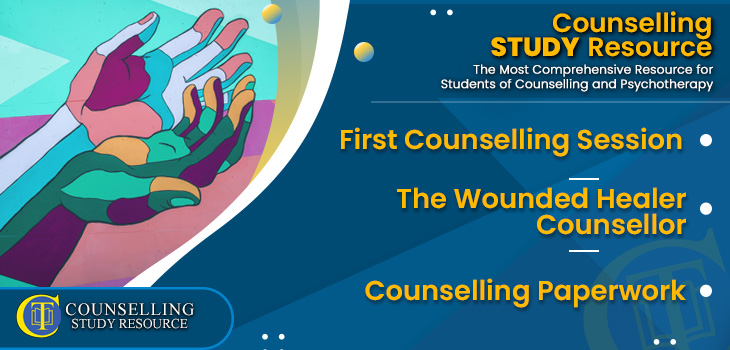207 - The Wounded Healer Counsellor
First Counselling Session – Counselling Paperwork
In Episode 207 of the Counselling Tutor Podcast, Rory Lees-Oakes and Ken Kelly return with your favourite three sections:
- This week’s ‘Counselling Foundations’ looks at the first counselling sessions - both your first session as a counsellor and the first session with each client.
- Then in ‘Focus on Self’, Rory and Ken discuss the wounded healer counsellor.
- And finally in this week’s ‘Practice Matters’, Rory speaks with Tamara Howell about paperwork.
First Counselling Session [starts in 1:50 mins]
First counselling sessions are bound to be nerve-racking, whether it’s your first session with a new client or the first session of your professional career.
In this segment, Rory and Ken share personal advice and experiences on first counselling sessions:
- Doing your best and being yourself are the most important things to remember.
- Remembering to sort out contracting the first time you meet with a client, you can even practice this with a peer.
- Silence and active listening – two of the most important skills you should be bringing into the therapy room.
- Acknowledging that by the time you get into the practice room, you’re good enough. You have earned the right to be there.
- Those feelings of nervousness are a sign of your passion.
A handout about the first counselling session can be downloaded in the green button above.
The Wounded Healer Counsellor [starts in 19:50 mins]
In this week’s Focus on Self, Rory and Ken discuss the term ‘the wounded healer’ and share things to be cautious of when you meet yourself in the therapy room:
- Be careful of over self-disclosure. You should avoid projecting yourself onto the client.
- Make sure you’re sufficiently healed to work with a client.
- Use your own experiences as a source of empathy – not as a way to solve your client’s situation.
- Aim to be the person you wanted during your own crisis.
- Think about your own ‘why’. Why did you decide to work in the service of others?
Counselling Paperwork [starts in 36:06 mins]
Rory speaks to Tamara Howell, a good friend of Counselling Tutor with an enthusiasm for something others tend to dread – paperwork.
The key points from this discussion are as follows:
- Paperwork is there to protect the client, and to protect us.
- Having things in writing can help you to be present and focus on the client.
- Tamara’s bare minimums of paperwork such as contact details, a therapy contract/agreement (outlining things such as boundaries), a welcome note, and informed consent.
- Working online requires more paperwork (on privacy, environment and security etc.).
- The importance of emergency contact paperwork.
- Being prepared gives you confidence.
- Paperwork is in the service of the client.


